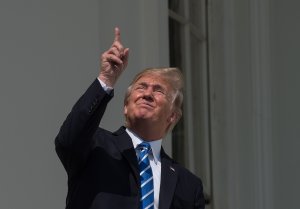President Donald Trump, on the White House South Portico, seemingly looked directly into the sun at the peak of the solar eclipse without any protective glasses Tuesday.

“At approximately 2:39, the president initially gesticulated to the crowd below and pointed at the sky. As he did so, one of the White House aides standing beneath the Blue Room Balcony shouted ‘don’t look,'” a White House pool report of the moment read.
Trump did, eventually, put on protective eyewear — as did first lady Melania Trump.
An article titled “Can you really go blind staring at a solar eclipse?” posted by CNN on Monday stated the following:
“The retina may translate light into an electrical impulse that the brain understands, but one thing it can’t translate to your brain is pain. So even if you’re excited about the eclipse and think one brief glimpse at the sun before it completely hides behind the moon is worth it — it’s not. There’s no internal trigger that is going to let you know that you’ve looked at the sun for too long. Any amount of looking at it is too long.
Even the smallest amount of exposure can cause blurry vision or temporary blindness. The problem is, you won’t know whether it’s temporary.”














